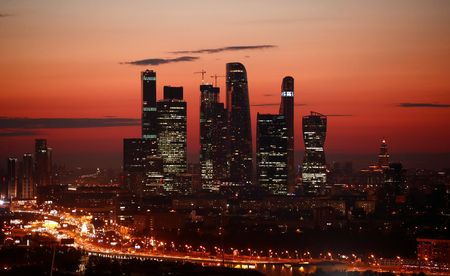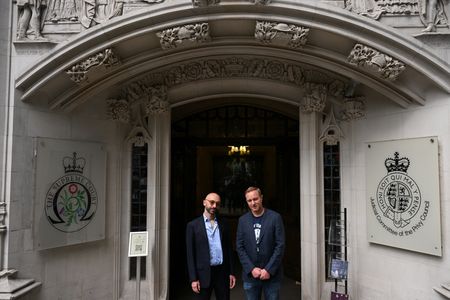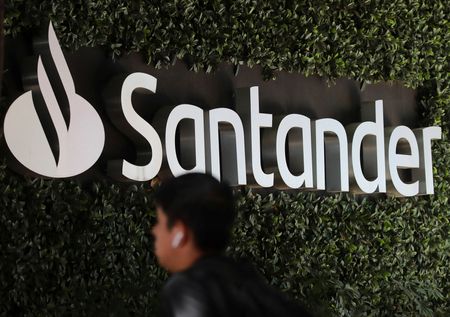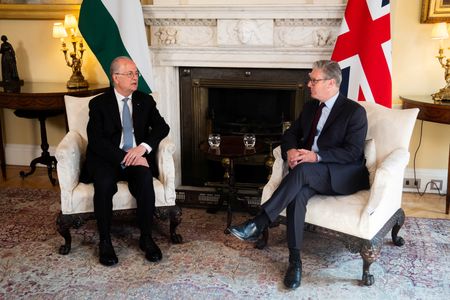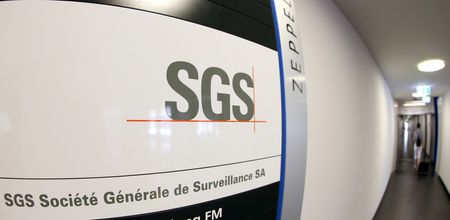By Elena Fabrichnaya
MOSCOW (Reuters) -After recording record profits thanks to robust demand for loans even at sky-high interest rates, Russian banks are now hoping a cycle of rate cuts will nip concerns about rising overdue consumer debt in the bud.
Analysts polled by Reuters expect the Bank of Russia to slash borrowing costs by 200 basis points to 18% when it meets on Friday in what would be its deepest cut since 2022, as an easing cycle after nearly two years of monetary tightening gathers pace.
With such high rates, credit risk is currently the main concern among banks, Renaissance Capital economist Andrei Melashchenko told Reuters, something that a mere 1% cut would not fundamentally change.
“But if the (easing) cycle continues…then towards the end of the year we will see lower spending on reserves by banks,” Melashchenko said. “And as the growth of the loan portfolio recovers, the share of problem debt will decrease.”
Russian banks’ combined profits of 1.7 trillion roubles in the first half of this year have enabled them to build up capital reserves as loan servicing has deteriorated with the central bank holding its key rate steady at a more than 20-year high of 21% from October to June.
State-owned VTB Bank told Reuters this month that every 1% interest rate cut gave it an extra 20 billion roubles in profit. CFO Dmitry Pyanov said VTB stands to benefit above all others because its high proportion of loans at floating rates carries greater risks of defaults and debt restructurings.
“What can undermine a bank’s financial sustainability?” Pyanov said. “It is the default of corporate clients, because problematic retail will hardly cause significant harm.”
BAD DEBTS ‘CONTROLLABLE’
Overdue consumer loans are nevertheless on the rise, even as rates have eased, although Central Bank Governor Elvira Nabiullina has sought to quash rumours of a looming crisis and said all bad debt is provisioned for.
A source close to the central bank told Reuters that a rate cut will boost banks’ profits and strengthen the sector’s capital position.
German Gref, CEO of Russia’s largest lender Sberbank drew attention to the growth of overdue consumer loans earlier this month but said everything was covered by reserves.
Sberbank is majority-owned by the Russian state and its shareholders, most of whom are in Russia and cut off from Western capital since the imposition of sanctions over the conflict in Ukraine, last month approved a record $10 billion dividend payout.
Some of Russia’s major lenders slumped to sanctions-induced losses in 2022, but with limited foreign competition and helped by two years of economic growth fuelled by defence spending, Russian banks reported record profits in both 2023 and 2024.
Bad consumer debt now accounts for 4.5% of banks’ overall retail loan portfolio, the central bank said in a review last week, up from 3.7% in December, since which time consumer deposit rates have been falling.
“Russian banks are managing to maintain margins, despite a noticeable increase in provisioning due to the deteriorating quality of the retail portfolio,” the central bank said.
“We see, indeed, that bad debts are gradually increasing,” Melashchenko said. “But for now, we still believe these values are controllable.”
Analysts also expect any outflow of depositors’ funds to the stock market to cause limited harm as the central bank has promised a smooth reduction in rates.
‘NO CHANCE OF DEFAULT’
As bad debts have grown, the central bank has raised macroprudential limits, forcing banks to increase reserves to cover possible credit risks.
Well-capitalised banks can expand their loan portfolios as credit risks decrease, said Melashchenko, while others are reducing lending rates and rebalancing assets towards less capital-intensive ones to build up a capital cushion.
The growing accumulation of bad debt is unlikely to bring down any major banks, Olga Naidenova, senior analyst at Sinara Investment Bank, told Reuters.
“Even if we look at systemically important banks, I think there is no chance that the state will allow them to default or anything like that,” said Naidenova. “They will find a way to support or recapitalise them.”
(Reporting by Elena Fabrichnaya; Additional reporting by Olesya Astakhova; Writing by Alexander Marrow; Editing by Hugh Lawson)

